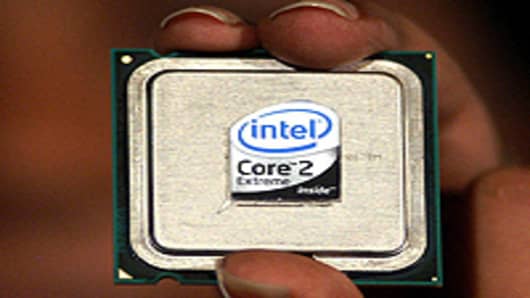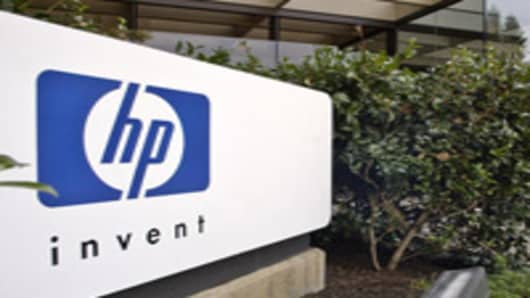There’s a transition occurring in the tech sector.
The traditional sector bellwethers—computer hardware, desktop software, consumer electronics—are no longer the areas of growth. It’s all about the enterprise.
“It’s looking for what hasn’t necessarily gotten better yet,” says Rob Cihra, senior vice president at Caris & Co. “We already know that the consumer market has been good within tech. Enterprise spending is just now starting to get better.”
Pent-up Demand
Despite the tech sector’s strong performance in 2009, IT spending has been weak. Gartner recently reported that 2009 will be the worst year on record for IT spending, with enterprise spending on a pace to drop 6.9 percent from 2008.
With the economy improving, however, businesses will be more inclined to ramp up purchases and upgrades, which they put off during the recession.
That’s particularly true among networking and communications companies, says Craig Berger, semiconductor analyst at FBR Capital Markets. He notes that while companies were slashing IT budgets, businesses are relying more and more on Internet-based and wireless data networks. Eventually, those companies will have to beef up their network infrastructures.
“There’s some pent-up demand forming,” Berger says. “So while the PC trade seems to be getting long in the tooth, the recovery in IT spending bodes well for enterprise chip firms and comm/networking firms. China’s already planning a very large spending ramp associated with its cellular infrastructure build out, so some of those comm/networking names play into those trends.”
Berger lists Silicon Labs, Broadcom and LSI among the companies that stand to benefit from an increase in enterprise spending.
“One stock that’s underperforming right now is Qualcomm,” Berger says. “Its got very attractive valuations, it’s a great franchise, it collects royalties on 3G devices, it’s one that could outperform within chips next year just based on the amount of underperforming we’ve seen in 2009.”
Companies that provide data center products, particularly storage, also stand to gain from an upswing in IT spending.
“Even throughout the downturn, corporations still invested in projects that were very high ROI projects that alleviated pain points within the corporate infrastructure,” says Toan Tran, technology analyst at Morningstar. “Storage companies like EMC and NetApp have been doing well and will continue because the volume of data you see stored every day increases.”
Software, Not Hardware
Adjusting your tech portfolio to accommodate the changes in the tech landscape means limiting your downside exposure.
Kim Caughey, senior analyst at Fort Pitt Capital Group, favors enterprise software and services because of the recurring revenue stream they provide.
“Software is now sold to corporations, more or less, on a subscription basis, which makes for very smooth revenues,” she says. “Companies like CA, BMC and of course IBM are three companies that have pretty smooth revenue streams. I would also look at business services providers like Accenture that deal only with the enterprise. That should limit the downside for investors.”
Analysts caution investors away from the PC sector, despite the release of Windows 7. But enterprises, which typically operate on a three-year refresh cycle for PCs, have been putting off upgrades. That was due both to the recession and the unpopularity of Windows Vista.
With so many large companies still running older Windows XP systems, Berger notes that there could be an uptick in PC sales later in 2010. But in the meantime, PC-related firms such as Dell, Hewlett-Packard and Intel may find themselves with excess inventory.
“There are concerns that the [hardware vendors] are ordering more products than they need as a result of the Windows 7 launch coming up,” Berger says. “Nobody wants to miss the Microsoft marketing muscle for the launch. But I don’t think consumers go out and buy new PCs because of a new operating system refresh. It may spur more corporate replacements for next year. You may see some handoff from consumer-driven PC trends toward corporate-driven trends as Windows 7 comes out.”
The More Things Change…
Although the names leading the charge may change, the fundamentals of tech investing remain the same.
Caughey recommends sticking with market-leading companies that serve a broad range of industries in several geographic regions. And make sure you do your homework regarding a company’s financial performance.
“Even in a recession, you would want to see this year’s revenues a little bit higher or at least flat with last year’s revenues,” Caughey says. “If you see it moving downward because of what has happened this last year, that’s probably a company that’s not in favor.”
The tech sector has been a bright spot for much of the year, and analysts believe the sector still has momentum going into 2010. For investors, it’s a matter of keeping up with the new growth areas.
“Some people are worried that tech has already had such a huge move that where is the opportunity from here,” Cihra says. “I think it’s unlikely that leadership will change from now until the end of the year. If you look at IT spending, tech company earnings, improving demand, improving revenue and earnings, and just from a near-term momentum standpoint, I don’t think that’s going to change.”



